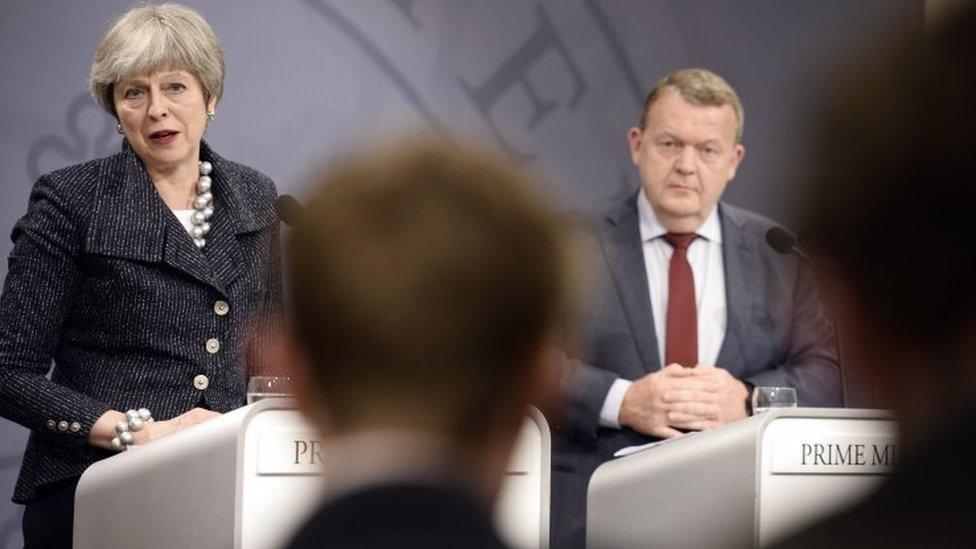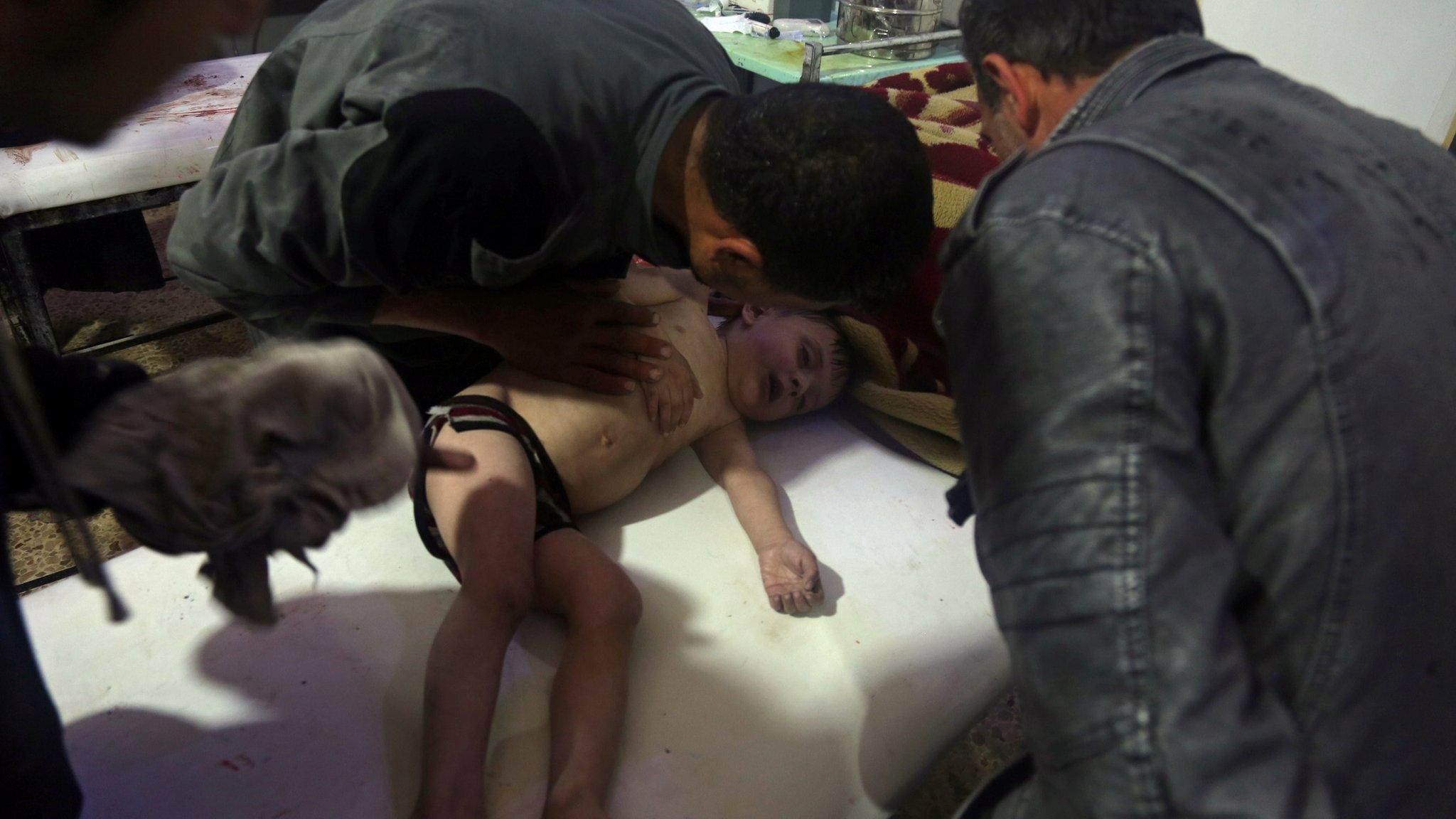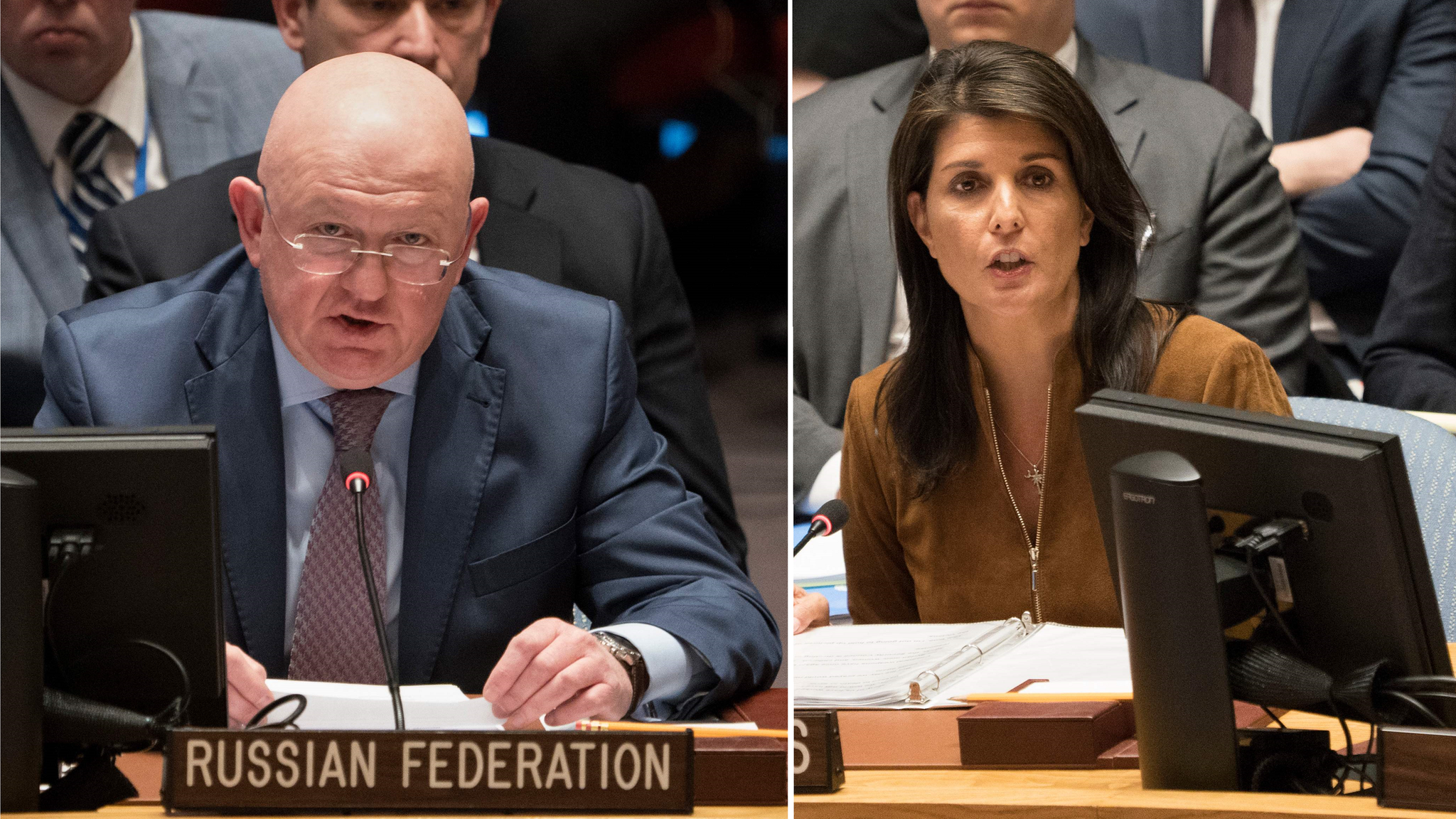Theresa May 'to act on Syria without MPs' vote' - sources
- Published
Suspected chemical attack is 'barbaric' - May
Theresa May looks ready to join military action against the Assad regime in Syria without first seeking parliamentary consent, well-placed sources have told the BBC.
The prime minister is said by government insiders to see the need for a response as urgent.
She wants to prevent a repeat of the apparent chemical attack near Damascus, which she described as "abhorrent".
Labour's Jeremy Corbyn has warned that bombing could escalate the situation.
Mrs May is understood to be reluctant to ask US President Donald Trump to hold off any action until she has the opportunity to consult MPs at Westminster.
Formally, she has yet to unequivocally point the finger of blame at the Assad government, the BBC's deputy political editor John Pienaar said.
She has spoken of the need for action "if" the regime is found to bear responsibility, he added, but the strong assumption in Downing Street and Whitehall is the attack will be attributed to the forces of President Bashar al-Assad. Action is thought likely to follow within days.
Mrs May earlier described the use of chemical weapons as a "humanitarian catastrophe" that "cannot go unchallenged".
She did not comment on Donald Trump's tweet warning Russia to "get ready" for missiles being fired at its ally Syria.

Analysis
By the BBC's Deputy Political Editor John Pienaar
The prime minister's instinct is to chew carefully on the decision of whether and how Britain should support action in response to the apparent chemical attack in Syria. She still speaks of the need to act "if" not "as" the Assad regime is responsible.
But the uncomfortable truth is the form of action is beyond her control.

Labour leader Jeremy Corbyn told the BBC that Parliament "should always be given a say on any military action".
"We don't want bombardment which leads to escalation and a hot war between the US and Russia over the skies of Syria," he added.
Lib Dem leader Sir Vince Cable did not rule out backing military but he said Parliament would have to give its approval and there would have to be "some strong conditions around it".
Medical sources say dozens of people were killed, including children, during the alleged toxic bombing of the formerly rebel-held town of Douma, in the Eastern Ghouta region.
Russia has described the reports of the chemical attack as a "provocation" designed to justify Western intervention against the Syrian regime.
Jeremy Corbyn: Military action risks escalating Syria crisis
Mrs May described the alleged chemical attack as a "shocking, barbaric act" and said she was "appalled but not surprised" at Russia, which vetoed a US-drafted UN resolution proposing a new inquiry to establish who was to blame.
She said investigations were continuing but that "all the indications" were that the Syrian regime of president Bashar al-Assad, which denies mounting a chemical attack, was responsible.
The UK and its allies were looking at ways to "prevent and deter" the use of chemical weapons, she added.
On Tuesday she spoke on the phone with US President Trump and his French counterpart Emmanuel Macron, agreeing their three countries would work together to take action to "uphold the worldwide prohibition on the use of chemical weapons".
The SNP called for action against the Syria government, including blocking its "purchasing and importing abilities" and sanctions against key people and companies.
The party's defence spokesman Stewart McDonald said that while the case for action was clear, air strikes "will not provide the long term solutions needed to end the war".
The fallout from the attack has sparked a war of words on who was responsible and what the response should be.
On Twitter, President Trump responded to a warning from Alexander Zasypkin, Moscow's ambassador to Lebanon, that missiles would be shot down and their launch sites targeted if they threatened the lives of Russian personnel.
"Russia vows to shoot down any and all missiles fired at Syria," he wrote.
"Get ready Russia, because they will be coming, nice and new and 'smart!'"
On Tuesday President Macron said that if military action was taken, it would target "the regime's chemical capabilities", and not the forces of its allies, Russia or Iran.
Speaking in Paris, he said he did "not want an escalation" and that a decision would be made in the coming days.
The information that France had showed "chemical weapons were indeed used and that the regime could clearly be held responsible", Mr Macron added.
On Tuesday the UN Security Council failed to approve moves to set up an inquiry into the alleged attack on Douma.
As permanent members of the council, Russia and the US vetoed each other's proposals to set up independent investigations.
The US-drafted resolution would have allowed investigators to apportion blame for the suspected attack, while Russia's version would have left that to the Security Council.
The Organisation for the Prohibition of Chemical Weapons had said earlier that inspectors would travel to the town to investigate.
- Published10 April 2018

- Published10 April 2018

- Published9 April 2018
